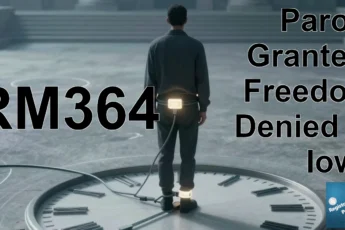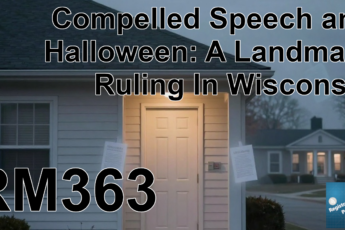Exploring the Full Faith and Credit Clause: Can Judicial Orders in One State Protect You in Another?
In the ongoing discourse surrounding laws and regulations in the United States, there’s perhaps no broader area of contention than the way states relate to one another under the Constitution. One frequently debated issue involves the Full Faith and Credit Clause (Article IV, Section 1) of the U.S. Constitution, which mandates that states respect the “public Acts, Records, and judicial Proceedings” of other states.
At first glance, this principle seems straightforward: if a legal decision is made in one state, it should be honored by all others. But how does this apply in practice, particularly when an individual moves between states? For example, if a person is released from a legal obligation in one state—such as the requirement to register as a sex offender—shouldn’t that release be recognized universally across state lines? This thought-provoking question forms the crux of today’s discussion.
The Legal Landscape: Full Faith and Credit Clause at a Glance
The Full Faith and Credit Clause essentially serves to promote legal consistency and cooperation across the United States. Without it, states could operate as self-contained entities, refusing to recognize the laws, rulings, or contracts of their neighbors. Under this framework, everything from marriage licenses to court rulings receives legal acknowledgment nationwide.
For instance, if a couple gets legally married in one state, their marital status is recognized if they move to or travel through another state. Similarly, a court decision, such as a custody ruling or contractual dispute resolution, is expected to maintain its legitimacy across states.
But despite the sweeping language of this constitutional provision, its application has limits—particularly when it comes to civil regulatory schemes that vary from state to state. This complexity becomes particularly evident when examining specific legal quandaries, such as sex offender registration laws and what happens when someone is legally released from such a requirement.
Unequal Laws for Equal Citizens: The Sex Offender Registration Debate
Sex offender registration laws are a prime example of civil regulatory schemes that vary significantly by jurisdiction. Some states allow individuals to petition for removal from their state’s registry after a set period or upon completing specific conditions, such as demonstrating good behavior or showing no continued risk to the public. In contrast, other states have stricter laws, emphasizing lifetime registration or imposing additional layers of bureaucratic oversight.
This discrepancy leads to an important question, as posed in the provided discussion: if a person is legally released (or “times out”) from registration in one state following a judicial or legal process, why do they often find themselves back on the registry after relocating to another state? Doesn’t Article IV’s Full Faith and Credit Clause offer protection in such situations, ensuring that legal judgments in one state are respected in another?
Exploring the Limits of the Full Faith and Credit Clause: Examples and Challenges
While the principle of Full Faith and Credit aims to create continuity between states, it does not eliminate a state’s ability to apply its own laws to individuals within its jurisdiction. This is where the legal waters become murky, particularly with issues like sex offender registration, which is widely recognized as a civil regulatory scheme rather than a punitive measure.
The Car Emissions Analogy
One of the speakers in the conversation draws an instructive analogy to car emissions tests. In New Mexico, for instance, older vehicles eventually “age out” of having to undergo emissions testing. However, if you take that car to New Jersey—which presumably doesn’t have such an exemption—you’ll be required to comply with their stricter emissions standards. Essentially, by moving to a new state, you are subjected to its regulations, regardless of what was previously acceptable in your former home state.
The same principle seems to apply to sex offender registration laws. Even if a court in one state determines that someone no longer needs to register due to a demonstrated lack of ongoing risk, another state has the authority to impose its own registration rules on that individual upon their relocation. That state may not view the original court’s decision as having jurisdiction over its own laws, thus creating friction between the intent of the Full Faith and Credit Clause and the application of state-specific regulatory schemes.
Is the Sex Offender Registry Comparable to Marriage Rights?
To further unpack this legal conundrum, one might consider the famous Supreme Court cases surrounding same-sex marriage. Before the Court’s landmark decision in Obergefell v. Hodges (2015), some states recognized same-sex marriages performed elsewhere while others did not. This created significant practical problems for couples who relocated to states unwilling to recognize their marital status, such as difficulties filing joint tax returns or securing spousal benefits.
The Court ultimately ruled that denying recognition to legally married couples moved from one state to another was unconstitutional. This decision reinforced the unifying influence of the Full Faith and Credit Clause, ensuring that a marriage properly sanctioned in one state could not be nullified elsewhere. But could a similar argument be made for sex offender registration rulings?
The answer, at least for now, is complicated. Marriage rights involve equal protection and fundamental liberties, areas where the courts tend to take a more robust interpretive stance. Meanwhile, the sex offender registry is viewed less as a matter of individual rights and more as a state-administered public safety measure, which gives states wide latitude to establish their own rules.
A Path Forward: Litigating the Full Faith and Credit Question
The conversation raises intriguing possibilities: could the application of the Full Faith and Credit Clause to sex offender registration laws be challenged in court? Potentially, yes. Courts might eventually be asked to decide whether a judicial order in one state asserting that someone no longer poses a threat could supersede the regulatory requirements of another state. However, until such litigation occurs—or unless Congress intervenes with overarching federal legislation—these conflicts will remain unaddressed.
In practical terms, individuals caught in this cross-state legal trap are often left to fend for themselves. One suggestion from the discussion is for affected individuals to carry certified copies of the judicial orders exempting them from registration. Presenting such documentation to law enforcement or during legal proceedings in another state might provide clarity. However, as the speakers point out, the unpreparedness of local officials to deal with such documentation could create confusion or even resistance.
Key Takeaways: Moving Forward
-
Full Faith and Credit Has Limits: While the Constitution promotes interstate respect for legal decisions, it does not override states’ rights to enforce their own laws in areas like civil regulatory schemes.
-
Advocacy Through Litigation: The application of the Full Faith and Credit Clause to sex offender registration laws remains largely untested in high-profile court cases. Future litigation may refine how this principle is applied.
-
Understand Local Laws Before Moving: Anyone affected by state-specific regulatory schemes should fully understand the legal landscape of their destination state before relocating.
-
Documentation Can Be a Tool: Though it may not solve every issue, carrying certified copies of court rulings or legal exemptions could help disarm legal challenges in a new state.
The broader lesson? The interplay between federal law, constitutional principles, and state-specific regulations is complicated—and evolving. While the Full Faith and Credit Clause offers a powerful tool for legal consistency, its application remains subject to the unique dynamics of state governance and the cases that challenge its boundaries.



Leave a Comment